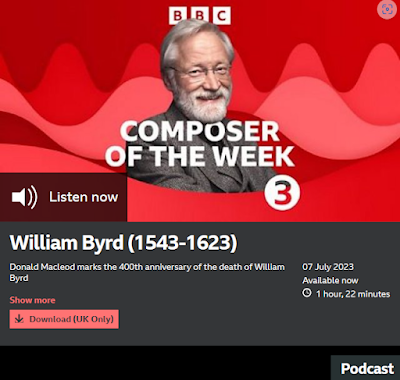The following is an extract from 'The Life and Times of William Byrd: A Local History'.
The memorial, funded by a surplus from the
London celebrations includes “the words, in raised
lettering, “A Father of Musick”, these being taken from the Byrd entry in the
‘Cheque Book’ of the Chapel Royal”[1].
Its unveiling was marked by a Service on 12th March 1924, reported in The Times and locally in the Essex Review and the Essex County Chronicle and was attended by twenty men and boys of the Chapel Royal who sang a selection of Byrd’s work. The officiating preacher was Dr Gary Warman, the Bishop of Chelmsford, who unveiled the memorial: “Things were so arranged that the Bishop could easily manipulate the light cord from the pulpit”[2].
“Considerable local and general interest was taken in the historic event [on Wednesday] and the church was filled some time before the service started. An imposing touch of colour was provided by the long scarlet and gold-braided coats of the boy choristers, with the white laced ruffs as were used in Byrd’s time”.
“The service (which was conducted by the Rev. L. J. Percival) took the form of evensong, with sung responses by Byrd. Psalm 84, ‘O how amiable are Thy dwellings’, was chanted, and the first lesson read by Canon Reeve, was from Ecclesiastes. 44, verses 1-16. In the place of the Magnificat, Byrd’s anthem, ‘O praise the Lord, ye saints above’ was finely rendered, followed by the second lesson, read by Canon Galpin [of Faulkbourne, also president of the Essex Archaeological Society[3]], from Revelation 7, verses 9 to the end. For the Nunc Dimittus, the anthem, ‘Come to us we beseech Thee’ (Byrd), was substituted. After the third collect, ‘Justorum Animae’ (Byrd) was sung, followed at the close by the hymn ‘For all the Saints”, sung to the tune by Vaughan Williams. Practically all the singing was unaccompanied. The choir, led by Mr Stanley Roper[4], gave faultless renderings.
“The Bishop of Chelmsford, in the course of an address, said William Byrd’s gift was marked by three main features, each of interest. He gave his best music for the rites and ceremonies of his own Church. His Church was not theirs, but they respected him. In his day, the English Liturgy was in the process of revision. Men were wanted to give musical settings for the new versions, and William Byrd gave them”[5].
“Canon Reeve [who from the outset took a keen interest in the erection of the tablet] thanked the committee for a beautiful gift in memory of the distinguished parishioner of by-gone days and said that he was honoured to accept the tablet”[6].
Reeve later wrote, “I little thought, twenty years ago,
that I should have witnessed such a Service … or found Stondon so generally
accepted as Byrd’s home and burial place”[7].
# The extract comes from the essay 'Reviving Byrd. The 1923 Tercentenary' contained within a new book entitled 'Byrd Studies in the twenty-first century' edited by Samantha Bassler, Katherine Butler & Katie Bank. (Clemson University Press, 2023)
[1]
The Times.
[2]
ERO T/P 188/3 f688
[3]
Canon Francis William Galpin was not only a professional colleague of Reeve but
also a gifted musician and leading authority on ancient musical instruments. He
wrote many articles and was co-author of ‘Church Plate in Essex’ (1926). He was
a handsome man with dignified bearing, who never discarded his frockcoat and
broad-brimmed hat of the Victorian age.
[4]
Stanley Roper was organist and leader of the Chapel Royal choir and the
director of the Elizabethan Madrigal Society. Also present was Dr. Charles
Macpherson, organist of St Pauls Cathedral. The Service was conducted by the
Rev. L J Percival, Preceptor of the Chapel Royal. (Source: The Times. 17 March
1924)
[5]
The Times.
[6]
[7]
ERO T/P 188/3 f699









